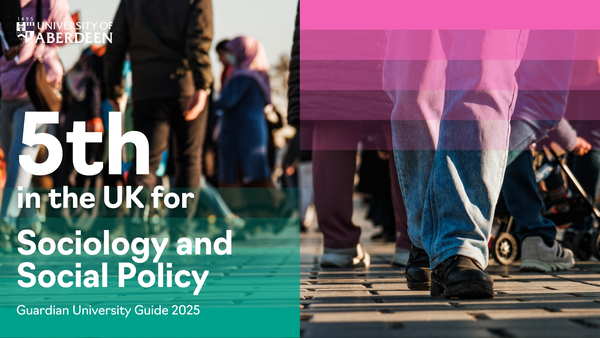
Introduction
This programme investigates how gendered violence arises, is quelled, and our response to it, during and in the aftermath of violent conflict. Using the theories and practices of sex/gender and post-war recovery, the course brings into focus the nuances of development, reconciliation and the psychological implications of sustained exposure to violence.
Study Information
Study Options
- Learning Mode
- On Campus Learning
- Degree Qualification
- MSc
- Duration
- 12 months or 24 months
- Study Mode
- Full Time or Part Time
- Start Month
- September or January
- Location of Study
- Aberdeen

According to the United Nations High Commissioner for Refugees (UNHCR) gender-based violence refers to “harmful acts directed at an individual based on their gender." It is rooted in gender inequality, the abuse of power and harmful norms. Gender-based violence can take various forms, including physical, sexual and psychological violence. Examples include domestic violence, harassment, rape, institutional and structural violence, trafficking, and violations of human rights during times of conflict and peace.
This programme engages critically with contemporary debates on this subject, providing you with an in-depth understanding of the ways people think about violence, understand it, and respond to it. You will consider how do we decide what counts as violence or a violent act and examine why responses to violence often seem inadequate, especially in the case of gendered and sexual violence.
This programme can be used as preparation for further research (for example PhD studies); to develop your career within sectors where violence is relevant (for example the voluntary, advocacy, charity, NGO, or policy sectors); or simply to further your interest in this fascinating area.
The MSc draws on the exceptional expertise within the Department of Sociology at the University of Aberdeen in the understanding of religion, political violence, conflict and peace, social movements, identity processes, and global and political sociology. You will also learn the latest advanced qualitative methods employed by social scientists, including participant observation, qualitative interviewing, focus groups, diaries, photography and film, and archived data sources.
Available Programmes of Study
- MSc
-
Sex, Gender, Violence
Qualification Duration Learning Mode Study Mode Start Month LocationMSc 12 months or 24 months On Campus Learning Full Time or Part Time September MoreMSc 12 months or 24 months On Campus Learning Full Time or Part Time January Aberdeen MoreProgramme Fees
Fee information Fee category Cost EU / International students £23,000 Tuition Fees for 2025/26 Academic Year UK £11,100 Tuition Fees for 2024/25 Academic Year
We will endeavour to make all course options available. However, these may be subject to change - see our Student Terms and Conditions page.
Fee Information
Additional Fee Information
- Fees for individual programmes can be viewed in the Programmes section above.
- In exceptional circumstances there may be additional fees associated with specialist courses, for example field trips. Any additional fees for a course can be found in our Catalogue of Courses.
- For more information about tuition fees for this programme, including payment plans and our refund policy, please visit our Tuition Fees page.
Scholarships
All eligible self-funded international Postgraduate Masters students starting in September 2025 will receive an £8,000 scholarship. Learn more about this Aberdeen Global Scholarship here.
To see our full range of scholarships, visit our Funding Database.
How You'll Study
A weekly timetable consists of an average of 6 teaching hours per week with some courses running over 3 week periods. Teaching includes a range of interactive methods and approaches to learning in order to enhance students’ critical thinking, presentation and interpersonal skills. Courses are assessed through essays, presentations, group and project work. The variety of assessment in the programme ensures that students apply theory to practice and become expert communicators and team players. The programme is designed for full-time or part-time students
Learning Methods
- Lectures
Assessment Methods
Assessment methods vary from course to course and include essays, reports, exercises and presentations. Courses are 100% continuous assessment, but perhaps, with the exception of the specialist option, relating to the dissertation topic.
Why Study Sex, Gender, Violence?
- Study at a nationally recognised university for sociology and policy. The University of Aberdeen is ranked 3rd in Scotland for Sociology (Complete University Guide 2025), 5th in the UK for Sociology and Social Policy (Guardian University Guide 2025) and 7th in the UK for Sociology (The Times and Sunday Times Good University Guide 2025)
- The University of Aberdeen is ranked 2nd in Scotland for Overall Student Satisfaction in Sociology, Social Policy and Anthropology (National Student Survey 2024)
- The Department of Sociology at the University of Aberdeen enjoys a reputation as one of the leading centres for the study of sociology in the UK, being recognised nationally and internationally for the outstanding quality of teaching and research
- Research and analyse issues relating to gender from diverse theoretical perspectives, and develop an advanced understanding of cause and effect on society not just in terms of outcomes but the overall effect on people and nations
- The MSc Sex, Gender, Violence is valued internationally with research being carried out across the world at the University of Aberdeen
- The programme encourages you to consider the real-world implications of how we perceive and talk about violence in conflict and post-conflict societies, and peacetime
- The MSc curriculum facilitates alternative ways of studying violence, including through the active use of post-colonial lenses and the cultural medium
- This programme can be used as preparation for further research (e.g. PhD studies) or to develop your career within sectors where violence is relevant (for example the, advocacy, charity, NGO, or policy sectors)
- In addition to your focus on gendered and sexual violence, you will also choose courses that reflect the department’s other areas of expertise and current research, in topics such as Globalisation, Peace and Conflict Studies, and Comparative European Societies
Entry Requirements
Qualifications
The information below is provided as a guide only and does not guarantee entry to the University of Aberdeen.
Applicants for admission will normally be expected to hold a relevant Honours degree with a 2:1 standard from a recognised university or body.
Applicants without this qualification may be admitted subject to having an alternative qualification, or an approved level of work experience appropriate to the field of study. Also taken into careful consideration is the trajectory of results, an applicant without an overall 2.1 but with 2.1 results in their final two years of study may be admitted.
Please enter your country or territory to view relevant entry requirements.
English Language Requirements
To study for a Postgraduate Taught degree at the University of Aberdeen it is essential that you can speak, understand, read, and write English fluently. The minimum requirements for this degree are as follows:
IELTS Academic:
OVERALL - 6.5 with: Listening - 5.5; Reading - 6.0; Speaking - 5.5; Writing - 6.0
TOEFL iBT:
OVERALL - 90 with: Listening - 17; Reading - 21; Speaking - 20; Writing - 21
PTE Academic:
OVERALL - 62 with: Listening - 59; Reading - 59; Speaking - 59; Writing - 59
Cambridge English B2 First, C1 Advanced or C2 Proficiency:
OVERALL - 176 with: Listening - 162; Reading - 169; Speaking - 162; Writing - 169
Read more about specific English Language requirements here.
Document Requirements
You will be required to supply the following documentation with your application as proof you meet the entry requirements of this degree programme. If you have not yet completed your current programme of study, then you can still apply and you can provide your Degree Certificate at a later date.
- Degree Certificate
- a degree certificate showing your qualifications
- Degree Transcript
- a full transcript showing all the subjects you studied and the marks you have achieved in your degree(s) (original & official English translation)
- Personal Statement
- a detailed personal statement explaining your motivation for this particular programme
- Reference x 2
- two reference letters, one of which should be from your university discussing your academic ability. If you have been out of education for a long time you may wish to use your current or most recent employers, or other professional individuals
Aberdeen Global Scholarship
Eligible self-funded Postgraduate Taught (PGT) students will receive the Aberdeen Global Scholarship. Eligibility details and further information are available on our dedicated page.
Aberdeen Global ScholarshipCareers
This MSc programme provides you with a critical and informed understanding of this subject, ideal for careers in international development, charities/NGOs, policy, human rights, and peace-building.
You will also develop high-level skills in research, analysis and communication, which are in demand across many sectors and industries.
Previous graduates of this programme have gone on to roles in charities and grassroots organisations, while others have progressed on to PhD programmes to pursue academic careers.
Examples of potential careers:
- International Development
- Diplomacy
- Security
- Peace building
- Charities
- Non government organisations
- Women's rights
- International Justice
Career Opportunities
- Advisor
- Development Officer
- Government Officer
- International Non-Governmental Officer
- Public Advocacy
- Research Consultant
- Social Researcher
- Support Worker
Our Experts
- Programme Coordinator
- Dr Luisa Gandolfo
Information About Staff Changes
You will be taught by a range of experts including professors, lecturers, teaching fellows and postgraduate tutors. However, these may be subject to change - see our Student Terms and Conditions page.
Features
Department of Sociology
The Department of Sociology is held within the School of Social Science. All of our degrees provide thorough advanced level training in the principles of social science with a wide choice of specialised subjects.
Get in Touch
Contact Details
- Address
-
Student Recruitment & Admissions
University of Aberdeen
University Office
Regent Walk
Aberdeen
AB24 3FX
